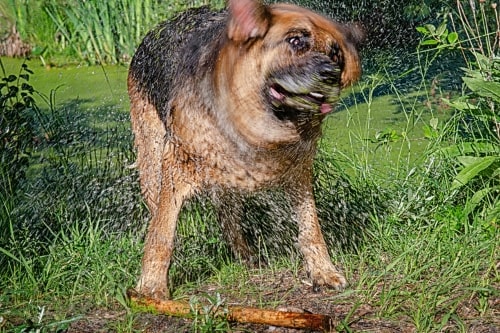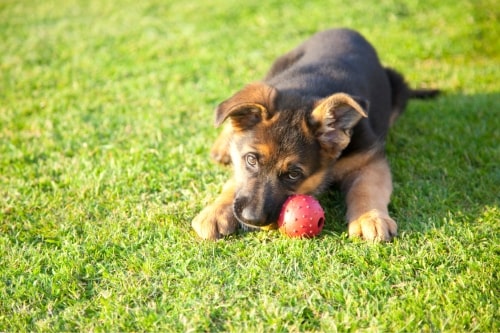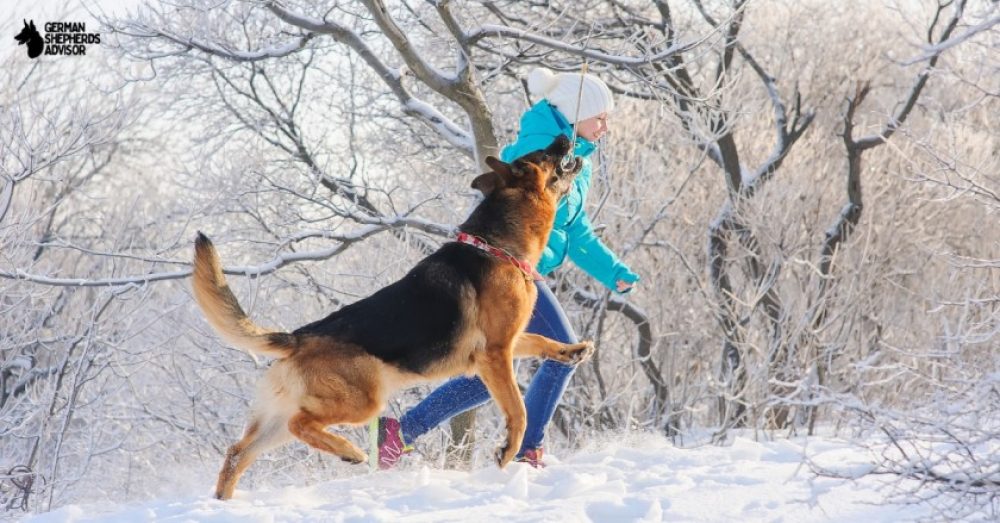We have a 2 year old German Shepherd that follows me wherever I go – even the bathroom. It is becoming more and more of an issue. Part of it may be separation anxiety because he always has to be touching someone. Part of it may be part of his training as a service/therapy dog. We also think some of it is him being very protective. He used to do this with my disabled son when he visited but once we told him no, he stopped following him around all day long and stayed in a corner while my son visited. An aquaintance suggested that we get our loyal dog another dog just for company so he isn’t lonely – sounds good except she wants us all to get along together under one roof! Any advice would be appreciated.
I am sorry about your son. That is very sweet that he used to follow him around, though I would never encourage anyone to lie to the dog into not following someone. While training might play a part in this behavior (and certainly can), there are many other possibilities as well. For example, it’s possible your dog was simply bored and looking for something to do. Perhaps you spend all day on the computer or on the phone ignoring him or maybe his days are filled with long hours alone outside while you work; if so, I suggest finding better ways to entertain him during the day (e.g., toys). There’s also a chance that since your dog follows you around all the time, you unconsciously give off signals that tell him to do so.
For example, you might pull on his leash when you get ready to go outside, or perhaps whenever he’s looking at you, you pat your leg for him to follow. If this is the case, I recommend ignoring him for a while – no eye contact, no talking, no touching – in order to see if he follows. If he doesn’t follow after about 30 seconds of ignoring him (you can drop a tasty treat on the floor in front of where he’s sitting), call his name and give encouragement when he comes to you (e.g., “good boy”), give him one of his toys and then try again at another time during the day. Doing this will help teach your dog that following you isn’t always rewarding. The last possibility is that your dog might be exhibiting separation anxiety. If this is the case, I recommend you take him to a good trainer for help. Overall, however, I think there are many things you can do to reduce his following behavior – whether it’s boredom, training, or separation anxiety – but the first step will be to try ignoring him during the day for a few days and see what happens. Good luck!
Getting my GSD pup back home after 4 months at Petsmart
Hi guys! Hope all is well. My girl will be 4 months on Sunday (I’ll be 18 soon too!). She was in Petsmart since she was 3 weeks old because my boyfriend couldn’t handle her. We were going through a rough time and he decided to give me full responsibility of her. As rough as it was, I knew Petsmart wouldn’t be the best place for a pup that young, so he let me bring her back home when she was 4 months old. I ended up staying with my parents since then because I didn’t have enought money to move out yet. My question is, how do we get her to readjust to living at home again? It’s been about 2 weeks now and she still barks super loud when we leave and comes running after us like “YOU CAN’T LEAVE ME HERE I HATE HER”. We’ve tried ignoring and taking her outside (we live in an apartment) but she won’t come in when we call her. I’m really worried about this because she’s literally gone through I don’t know how many homes by now, she needs a stable place to live and love!
Why do dogs follow you in the bathroom?
I recently saw a show on TV, where this scientist explained the reason why dogs follow us everywhere (even in the bathroom). Here’s what she said: Dogs are descendants of wolves, and when wolves needed to wait for their prey, they needed to be able to wait for very long periods of time without eating, drinking or chewing anything. To keep themselves occupied while waiting for the prey, they naturally started licking their paws and fur – like cats do when they’re bored. This action helped them to keep their claws and teeth sharp, and the prey meat gave them a good reason to be patient until it was time to eat. Well, when wolves became dogs, this behavior stuck with them even though they don’t have anything to kill anymore. So whenever you see your dog licking its paws or fur while following you around everywhere, it’s just their way of telling you that they love YOU very much! I hope this clears up any confusion!
In this article, we will discuss how to stop your dog from following you around.

First, why does a German shepherd follow their owner? It can be a combination of different things. For instance, the owner might have trained it in the past for this behavior and rewarded it whenever it followed them. It can also occur if the dog is anxious or stressed out by something that has happened.
Next, what are some ways to stop your German Shepherd from following you around? You need to first identify what triggers your dog’s behavior. This way you can avoid those situations as much as possible. When trying to stop your dog from following you around, make sure you do not create any new patterns that reward it for doing so. Also, make sure that you are consistent.
Finally, how can I reward my dog for staying? You need to make sure that your behavior is not reinforcing the unwanted behavior at all costs. Try using positive reinforcement whenever it is behaving well and ignoring it when it follows you around. Once the dog knows what you want from it, it will be easier to get them to stop following you around. This process works best when done gradually over time and by rewarding good behavior rather than punishing bad ones. If we really look into this problem we find out why dogs do this sort of thing in the first place: almost always because they were rewarded for doing so in the past (positive reinforcement). By punishing an undesirable behavior and rewarding a desirable one we modify our dogs’ behavior in the desired direction. However, this is not always easy with some behaviors (i.e., they are very strong) and in most cases it requires lots of time and patience; however, there are some things we can do to make training more efficient: keep sessions short (5-15 min), make sure our dog is engaged during the session (play with toy, give commands, etc.), be consistent by using same command for same behavior every day, be patient when trying to stop your German Shepherd from following you around. This way your pet will know that this is unwanted behavior and eventually will learn what you want from it.
Separation anxiety
Dogs are known to be den animals, which means that they like to keep their sleeping and eating areas clean and separate. They also tend to form strong attachments with their own “pack.” A dog’s pack can consist of just one other human or a group of humans. These tendencies may lead some dogs to become anxious when separated from their owners or regular companions. Separation anxiety is the distress and behavioral changes that occur when an animal is left alone or separated from his owner. Dogs do not outgrow this type of behavior; however, it may get better over time if the cause for the separation anxiety is addressed by the pet’s owner.
Separation anxiety typically presents itself in one of three ways: excessive salivating, destructive behavior, or urination/defecation. The dog may also whine, bark, howl or scratch at the door when alone. Some dogs that experience separation anxiety will lose their appetites and refuse to eat while their owners are away; others may become ravenous because they are so stressed about being left behind. This can lead to significant weight loss in pets whose owners fail to notice this symptom of separation anxiety.
One major cause for an anxious pet is stress or boredom during periods of time when he is expected not to engage in “pack” activities with his family members, such as when his owners leave him home alone during the day. He may become stressed because he does not know what to do while they are away and becomes anxious when left alone due to his pent-up energy and frustration. Boredom can also be a cause for separation anxiety: If your dog is left home alone all day with nothing to occupy him, he will tend to get into things and become destructive when you leave in an effort to release some of his energy or pass time until you return.

Fortunately, there are several strategies that pet owners can employ when their pets suffer from separation anxiety. First, make sure that your dog has plenty of exercise before leaving him alone in the house; this will help tire him out so that he sleeps more soundly when you leave and is less likely to become anxious and stressed. Second, it is important that your dog always knows where you are: Don’t sneak out and leave him alone; he will quickly learn that this makes you disappear and become even more anxious whenever you leave. Third, make sure to spend plenty of time with your pet before leaving him behind; play with him, take him for a walk or give him lots of attention until he has had enough and no longer desires your presence. Finally, make sure to visit the veterinarian to rule out any medical conditions such as urinary tract infection which may be making your pet uncomfortable when left alone.
Many dogs suffering from separation anxiety can be successfully treated by their owners without professional help. However, if the previously listed strategies are not effective, your pet may require the help of a professional trainer or veterinary behaviorist. With patience and time, it is possible for even the most anxious dog to overcome his distress at being left alone.
FAQS
Is there a favourite individual among German Shepherds?
Don’t get a German Shepherd dog/puppy unless you have the time and energy to commit to them. German Shepherds usually form attachments to one family member, but they can still be a good family dog.
How do German Shepherds express their love?
German Shepherds exhibit affection in a variety of ways, including getting thrilled when you get home, wagging their tail, leaning against you, snuggling with you, acting protectively toward you, and rolling over to expose their belly for some belly rubs!

